10 Romantic Movies of the 21st Century
Cinema as a medium has existed since the late 1800s. As Miriam Hansen reminds us in Babel and Babylon, mass audiences would gather in theaters as early as the 1900s. There has been no shortage of screen romances since cinema’s conception, and although there are plenty of classic love stories throughout the 20th century, it is my belief that the romantic film did not reach its full potential until the 21st century.
Three films that are largely responsible for this are Before Sunrise (1995), Before Sunset (2004), and Before Midnight (2013). All three of these films are directed by Richard Linklater and star Ethan Hawke and Julie Delpy as Jesse and Celine, an American boy and French girl who form the kind of instant connection most of us can only dream of. The films give us the best of both worlds. They present a love story in a realistic style in which the characters walk, talk, and get to know one another as most people do, but they also give us the kind of idealistic portrait of a relationship that most of us will never have. We don’t like movie romances for their realism. We like them for their idealism. The best ones, in fact, find a way to combine the two.
Ang Lee gave us his first of three great love stories in 2000, Crouching Tiger, Hidden Dragon. The film breathtakingly combines martial arts action sequences with melodramatic romance and the results are astonishing. Lee would similarly depict a more sexual romance within an espionage thriller in Lust, Caution (2007), an NC-17 film that features some of the best sex scenes of the decade.
In 2004, The Notebook (2004) arrived, and with it, the much needed resurgence of the weepie. While countless Nicholas Sparks adaptations have emerged since The Notebook, the Ryan Gosling and Rachel McAdams romance remains the standard. It is beautifully made and wonderfully acted, and if we are to judge it based upon what it sets out to do, we cannot deny that it is a romance of epic proportions. In fact, I will take it a step further: The Notebook is one of the best movies of 2004, if not the decade, and those who disagree merely do so because they do not want to be associated with liking anything in the mainstream. The same goes for Titanic (1997), while we’re at it.
Around the same time that Noah and Allie were fighting with each other, Charlie Kaufman and Michel Gondry gave us Eternal Sunshine of the Spotless Mind (2004), the most inventive film of the 2000s. Eternal Sunshine is weird, funny, and heartfelt, and it features the best work Jim Carrey and Kate Winslet have done in their astonishing careers. To this day, I find it surprising that a film as artistic, intelligent, and creative as this caught on with so many people. It is certainly a positive sign that Eternal Sunshine is the defining romantic film for the 21st century digital generation.
Brokeback Mountain (2005) was released a year later, and in Ang Lee’s western melodrama, we find Heath Ledger and Jake Gyllenhaal giving powerful performances as gay men who cannot express their love for one another in an intolerant place and time, Wyoming, 1963. Ledger’s performance, in particular, is reminiscent of Brando, and the fact that the Academy somehow thought that his over-the-top turn as The Joker is more worthy than this subtle, bruised performance as Ennis Del Mar shows how insignificant these awards can be. The film generated controversy and parody, mostly because Americans are intolerant to difference, but we cannot deny the impact Brokeback Mountain has had. Since then, many gay-themed love stories have been released, and a number of them are mainstream films with high-profile actors that have been nominated for various awards.
John Carney reinvented the musical with Once (2006), a realistic love story that incorporates hand-held, documentary like filmmaking with musical numbers. The difference between Once and say, Chicago (2002), is that the music in Once is good. It features the acoustics of Glen Hansard and Markéta Irglová, and if you can only have one soundtrack to play on repeat, surely Once would suffice. Contrast Once with Moulin Rouge! (2001), a radically different musical that is just as romantic and just as inventive, and we can see the many ways filmmakers have revised genres to tell love stories.
In addition to these works, there are the comedies of Judd Apatow that balance crude bathroom humor with sentimental insights, the rom-coms from Nancy Meyers that give older men and women a chance to fall in love, and the indie rom-coms like Garden State (2004), Sideways (2004), Something New (2006), and (500) Days of Summer (2009) that remind us that the romantic comedy once made relevant by Charlie Chaplin and Woody Allen doesn’t always have to be formulaic. More recently, we have seen such films as Blue Valentine (2010) and Like Crazy (2011) reflect our own relationships upon the screen in profound ways. Finally, as we enter the summer of 2013, we can look forward to such romances as The Spectacular Now and Blue is the Warmest Color, and revisit recent releases like To the Wonder and Amour.
Not every romantic film released is worthy; in fact, most of them are not. Romantic comedies and weepies, especially, tend to revert to cliche, and this leaves many casual moviegoers and studio executives dismissing the genre as dead. But if the horror genre finds a way to reboot itself after every decade, so, too, does the romance. In fact, as I hope to show, the romantic film has never been better, more believable, more mature, and more eclectic.
In addition to the films I have mentioned above, which to me remain the contemporary standards of the genre and ones that I think most people have seen, I have listed ten lesser-known movie romances that prove, once and for all, that the romantic film is here to stay.
10. Goodbye First Love (2011) dir. Mia Hansen-Løve

Goodbye First Love, as the title suggests, chronicles the romantic relationship between Camille (Lola Crèton) and Sullivan (Sebastian Urzendowsky) during their teenage years. The film is told from Camille’s perspective, mostly because she is 15 and Sullivan is 19, and because she is the one utterly consumed by the love she feels for a boy who does not share or understand her intense feelings. The film is romantic and wistful in its first half, accurately capturing the joy and infatuation that can only exist within the realm of young love. The second half becomes tragic and heartbreaking as Camille learns information that snaps her back to the reality of romantic anguish and the inevitability of love’s evaporation. This is a simple film, grounded in the small details of romantic relationships and in the fleeting emotions that accompany them. This is a difficult film because it feels painfully real, as if Hansen-Løve were recalling her own experiences as a teenager. Mostly, though, Goodbye First Love is life-affirming. It reminds us of our own romantic relationships and how each one felt like they would be our last, until we reached that point where we no longer wanted to make them last. It shows us how difficult and painful it felt to end them, only to realize a few weeks later that life indeed went on without these people we once called our own. Camille comes to this realization toward the end of the film in a beautiful moment that fully captures the essence of love, loss, and the uncertainty of the future.
9. Away From Her (2006) dir. Sarah Polley

Sarah Polley’s beautiful Away From Her arguably contains Julie Christie’s best performance, and for that alone it is worth seeing. Christie plays Fiona, an older woman coping with the early stages of Alzheimer’s disease. Her husband, Grant (Gordon Pinsent), has never lived a day without her, but as she struggles to remember who and where she is, she decides to check herself into a rest home. What follows is the slow disintegration of a love affair by the natural causes of old age and the deterioration of memory. If Goodbye First Love showcases the difficulties of young love, Away From Her asks us to consider what will happen during old age. As Polley demonstrates in her delicate film, it doesn’t get any easier. Young lovers often decide to separate and move on, mostly because they have their entire lives ahead of them and they are not ready to settle down with just one person. But Grant and Fiona have decided to stay together long ago, even after Grant carried on an affair with another woman during his time as a college professor. The fading of Fiona’s love for Grant is beyond her control–she simply cannot remember who he is. Grant must learn to deal with this, and the sacrifices that he makes, while not ideal, demonstrate how far he is willing to go for the woman that he loves.
8. Keep the Lights On (2012) dir. Ira Sachs

Set in Chelsea during the 1990s, Keep the Lights On captures the gay New York art scene with brutal honesty. Erik (Thure Lindhardt) is a documentary filmmaker who falls in love with Paul (Zachary Booth), a closeted lawyer who reluctantly forms a relationship with Erik. Erik is possessive and insecure; Paul is elusive and cold. Both have their flaws and issues, but there is a deep understanding between them, and one can sense that their relationship would work if each of them altered their personalities just a bit. Sachs depicts a romance between two men and there are indeed moments in the film that contextualize the romance within a specific counterculture, but the highs and lows of the relationship are relatable to anyone who has been in a relationship with the wrong person who, every now and them, feels so right. Erik and Paul want to be with each other but they know that they don’t belong together. They love each other but they can’t figure out how to love themselves. The film suggests that it is easier to keep the lights on at night, but sometimes we must confront what lurks in the darkness. Erik and Paul never figure that out.
7. In the City of Sylvia (2007) dir. José Luis Guerín
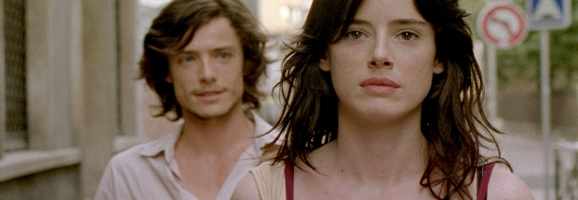
José Luis Guerín’s wonderfully inventive film is simple in its concept but rather complex in its execution. The premise is simple: A man returns to a city years after he met a mysterious beauty Sylvia in the hope of tracking her down. She has lingered in his memory and he is convinced that he will find her and not let her slip away again. The film is a languid meditation on memory, longing, and loneliness, and it painstakingly captures the essence of desire. This is experimental cinema at its finest, which means that the film forgoes narrative clarity for stylistic innovation. In the City of Sylvia requires patience and intelligence, but both are rewarded by the time the film reaches its harrowing conclusion. Cinema lovers will find delight in the film’s allusions to Hitchcock, Bresson, Rohmer, and Murnau, but Guerín’s film is its own thing, and one that demands our attention and admiration.
6. I Am Love (2009) dir. Luca Guadagnino
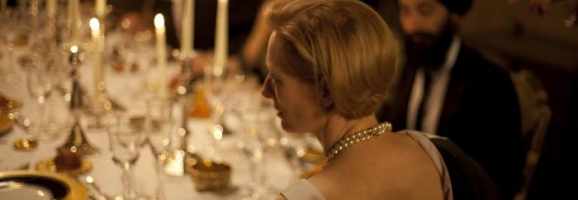
Tilda Swinton stars in this art-house masterpiece about the end of patriarchy and the rise of feminism in Milan at the turn of the millennium. Swinton plays Emma, an unfulfilled Russian housewife who carries on a steamy affair with Antonio (Edoardo Gabbriellini), her house chef. In a scene that is bound to raise a few eyebrows, Emma and Antonio make love outdoors in an open field, and here Gabbriellini contrasts the natural passion of lust with the stifling confinement of the household. Affairs may be wrong according to the ten commandments, but according to Gabbriellini, they are liberating. The film makes a case for infidelity and sexual rediscovery, and Swinton brilliantly portrays a woman who comes back to life after years of masking her boredom and discontentment. The final shot of the film is perfect. The door of the patriarchal household has been opened, and the open air slowly seeps through. We get a sense that this household has been irrevocably changed, and so have the lives of those who once inhabited it. Take a note of where Emma is by the time the film ends. Her presence, or absence, is the key to understanding what this film is about, and why it is one of Italy’s greatest achievements.
5. Crazy/Beautiful (2001) dir. John Stockwell
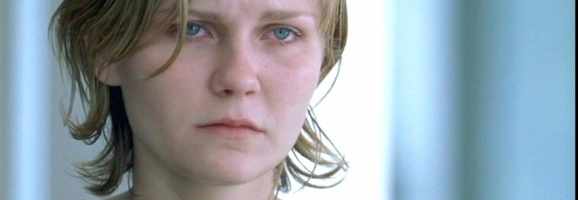
For some reason, this teen romance did not catch on with audiences. That is a shame, because it is one of the best teen romances to grace the screen. Kirsten Dunst plays Nicole, a rich girl with emotional issues who falls for Carlos (Jay Hernandez), a poor Latino boy with ambitious goals and a strong work ethic. Opposites indeed attract in this surprisingly authentic depiction of high school love. The film is void of sentimentality and overwrought cliches, and instead settles for emotional truths. Nicole loves Carlos but she also needs him. Carlos loves Nicole but he doesn’t need her, mainly because he did not have the kind of troubled childhood she experienced. It would be easier for him to let her go and carry on with his dreams, but he loves her too much to do that. He cares for her, but he also cares about himself, and sometimes it would be nice to be rid of her. The film is brave for capturing these conflicting emotions that we all feel, but rarely discuss. Relationships are crazy and at times they are not worth it, but when they are, they are beautiful. So is this film.
4. The Deep Blue Sea (2011) dir. Terence Davies
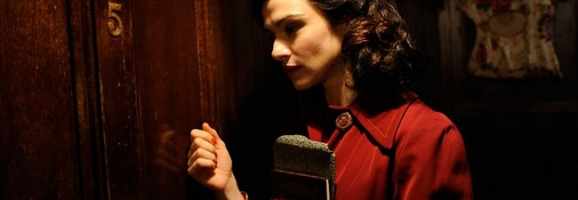
An old-fashioned weepie for the art-house crowd, The Deep Blue Sea is Terence Davies’ crowning achievement. The film portrays the doomed love affair between Hester (Rachel Weisz) and Freddie (Tom Hiddleston), an RAF pilot with whom Hester has a brief encounter while married to her husband Sir William (Simon Russell Beale). This is a tale of self-destructive love in which Hester is tormented by the decisions she makes and the consequences that arise from them. Weisz is excellent in a role that reminds us why she is one of the most underrated British actresses working today. There are scenes in the film in which Hester merely sits in a chair and smokes a cigarette, but her eyes show the longing, regret, pain, and heartache that can only come from a year’s worth of love.
3. Heaven (2002) dir. Tom Tykwer

Cate Blanchett gives a typically brilliant performance as Phillipa, a woman who blows up a building in order to avenge her husband’s death. She is arrested and put in a prison, but one of the prison guards (Giovanni Ribisi) falls in love with her and helps her escape. The two become lovers on the run, but this is not your traditional love story, nor does it resemble any conventional narrative. Tykwer’s film is unlike anything I have seen, and it is a beguiling and bewildering piece of work every step of the way. The opening scene is suspenseful, reminding us of the great kinetic energy of Run Lola Run (1998), but the second and third acts of the film are slower, allowing us to get lost in the film’s mesmerizing tonal rhythms. The final shot, in particular, is a slow burn of sheer genius, as we finally understand what gives the film its title. Heavenly indeed.
2. Head-On (2004) dir. Fatih Akin
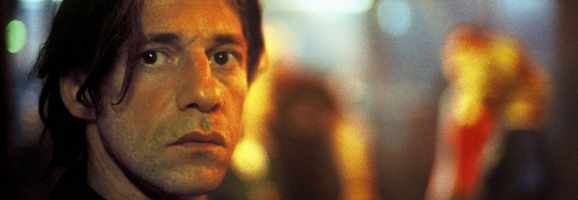
Few filmmakers are as bold and daring as Fatih Akin. Head-On is a love story between two messed up adults who literally hit rock bottom together and ultimately fall in love. They are screw-ups in every sense of the word, but they deserve our sympathy because they mean well and want to better their lives. After numerous suicide attempts, drug overdoses, drunken accidents, and violent outbursts, there comes a point where Chahit (Birol Ünel), a 40-something year man, wants to clean up his act and better his life. He eventually meets and forms a relationship with 20-something year old Sibel (Sibel Kekili), and what transpires is arguably the most authentic adult romance in cinema history. Like a more recent film Rust and Bone (2012), Head-On will be appreciated by those who have been hurt and hardened by life and by love. It is not a sentimental weepie. It is a gritty drama about defeat and disappointment. After the film, I was reminded of Bruce Springsteen’s “Tougher than the Rest.” This is a love story for those who hardly believe in love, but who are capable of meeting another person and settling for the kind of emotions they cannot feel by themselves.
1. In the Mood for Love (2001) dir. Wong Kar-Wai
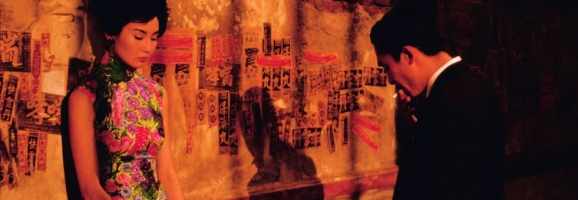
Wong Kar-Wai’s postmodern portrait of unrequited love illustrates the limitations of memory and our inability to truly know the past. A married man and woman in Hong Kong, 1962, develop the most subtle romance in the history of motion pictures. The film, like memory, shows us random snippets of their brief encounters, and it often provides us what-if scenarios as if to suggest that the characters are looking back on their time together and wishing things had gone differently. The truth of the matter is that they are married, their spouses are cheating on them with one another, and they don’t know how to deal with it. Unlike their spouses, Su Li-zhen (Maggie Cheung) and Chow Mo-wan (Tony Leung Chiu Wai) decide not to act on their feelings, even though we want them to as an audience, and even though they want to within the fictional world of the film. There is one particular scene in which the two characters have a conversation about ties. These clothing items are physical manifestations of their memories of a time and a place. In a postmodern world, we connect our most intimate memories to material items in an effort to recapture a past that may or may not have existed. Throughout the film, Wong Kar Wai’s direction similarly uses tangible things such as a tie, a bowl of noodles, or a song on the radio to represent the relationship between Su Li-zhen and Chow Mo-wan. This nostalgia permeates the film until the heartbreaking conclusion, in which we come to realize that even the tangible, material things that trigger our memory cannot compensate for the complex feelings of love.
As this list demonstrates, there is a romantic film for everyone. Not all movie romances are chick flicks and not all of them are sentimental, corny, cliche-ridden Nicholas Sparks adaptations or romantic comedies starring Sarah Jessica Parker. Romantic films can be daring, artistic, funny, exciting, challenging, intellectual, and even thrilling. Romantic films, dare I say it, can be cool. And when they’re done right, romantic films can be among the best that cinema has to offer.
What do you think? Leave a comment.











Wong Kar-Wai was destined to land the first spot. Good. Oriental movies are often said to be too slow, or boring, but they have no equals when trying to enter the deepest chords of human sensitivity.
I don’t think that I have enjoyed reading about movies this much before, I like to watch them usually. You have a very good skill for presenting these. As a Turk what I loved about the Head-On is its portrayal of the ever generic Turkish lover. It describes in amazing accuracy all the insane acts, the alcohol consumption to help the excessive pain, the quest for drama of Turkish lovers. This is a very accurate movie.
I’ve always loved crazy/beautiful and I’m really glad to see it on your list. Being a romantic drama & comedy buff, you’ve given me lots of new films to check out, thanks for the list.
I think if you changed the title to say “Romantic drama” it would be a bit more specific as to what the article is actually about. That aside, I loved reading it. I like that these films are not completely mainstream…. so it gives us incentive to go find them! I really like the sound of “Goodbye First Love” so I will see if I can find it anywhere!
Thanks for the article 🙂
‘I Am Love’ is an absolute masterpiece; insightful and unapologetic. Unfortunately I’ve only heard of a few other films that you’ve mentioned here, but a very informative and pensive article nonetheless!
I found Heaven complicated as it immediately challenges one’s desire to sympathize with the main characters. Very misunderstood and underrated.
Clearly I need to rent more movies, I have only seen a couple of these.
Interesting list.
I remember watching Wong Kar-Wai’s ‘In the Mood for Love’ a while back now, possibly because it was popular on Netflix, and was struck by how powerful it was. As you say, it is a very ‘subtle romance’ but so well played. An excellent film, I would urge anyone who likes understated, independent films to give this a viewing.
Very well written article, well done! Nice work 🙂
To this list, I would add: Miranda July’s “Me and You and Everyone We Know,” Hsaio-hsien Hou’s “Three Times,” and Andrew Haigh’s “Weekend.” I’ve seen all the ones on your list but the only one I could really say was great is “In The Mood for Love.” So breathtakingly beautiful.
Those are all great inclusions to the list. Hou’s Millennium Mambo is also great.
Wow, interesting choices! You really go beyond the typical Hollywood romances. I will definitely check some of these out.
Jon, I’d like to pop up and say hello! After reading this list, I’m thinking that… you are really the Jon I know!
I’m just noticing your comment now, but thanks and I take that as a compliment!
Really great list! enjoyable read. I will have to do some amazon shopping for some of these!
I feel like watching goodbye first love,just the sound of the name iz wow!!
Wong Kar-wai’s In the Mood for Love is a tour de force, I really loved the never-ending tension between the two protagonists, and how their attraction is never truly consumed leaving both the characters and the viewers wondering how things could have been if only they gave in to temptation.